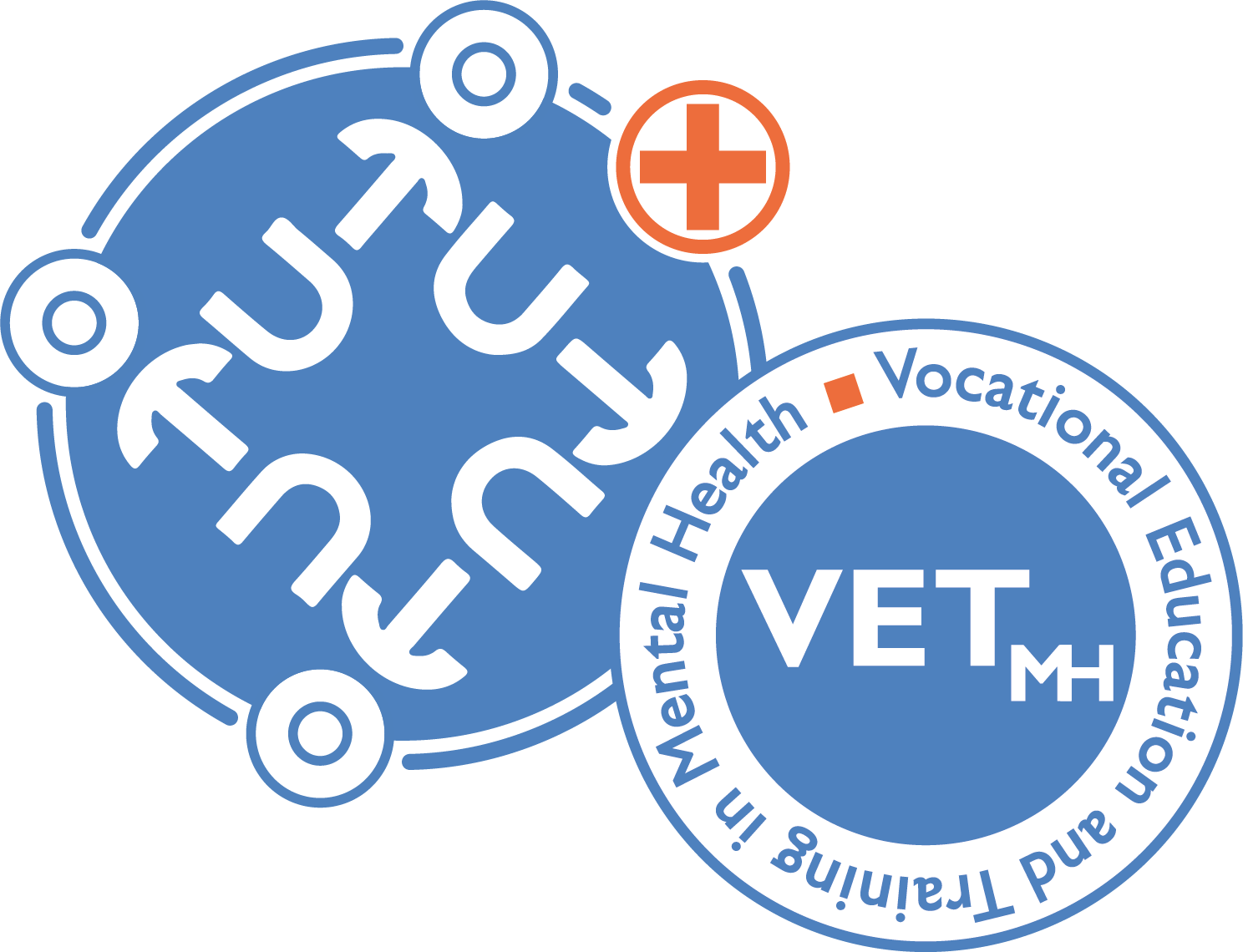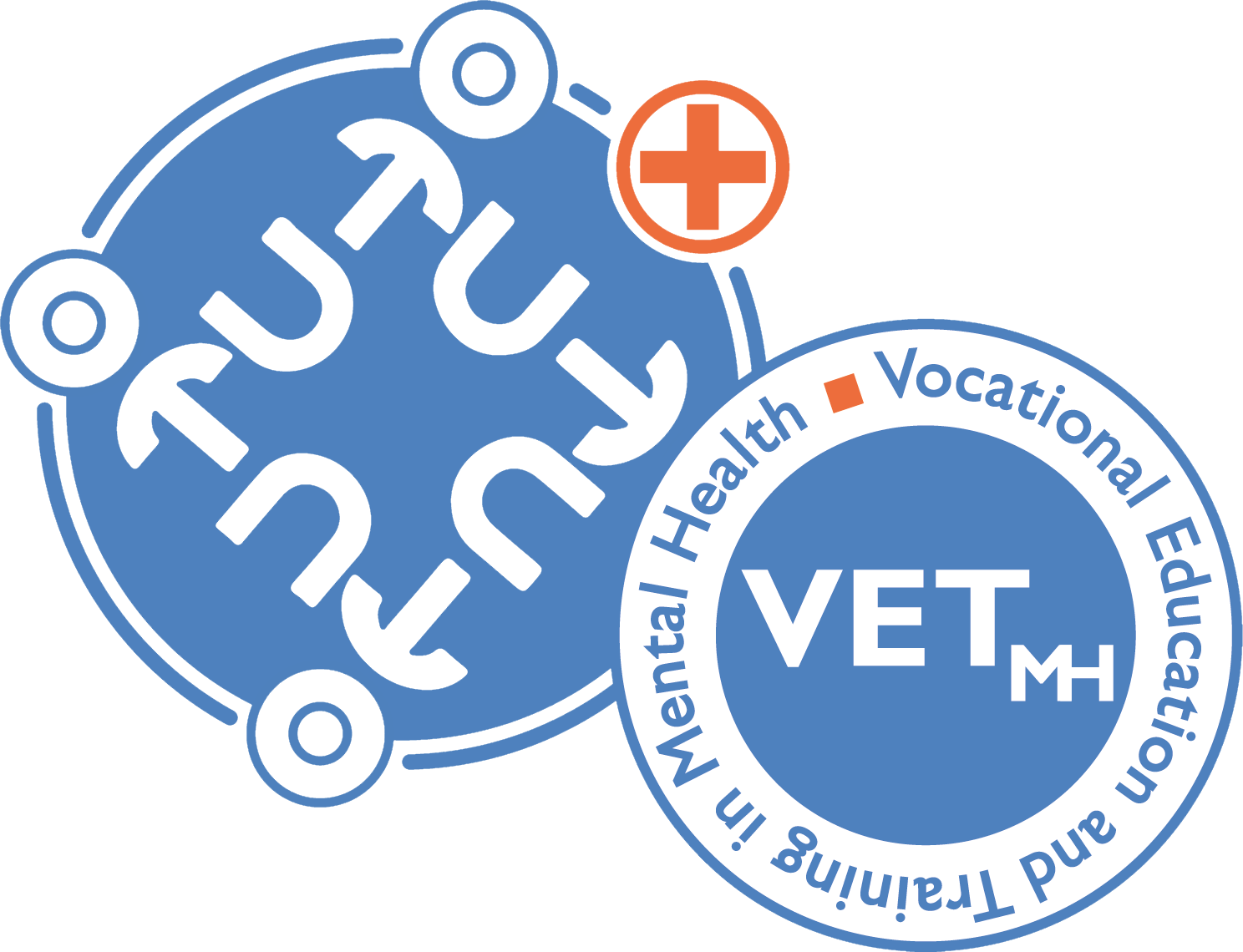| Project acronym | VETMH TuTo+ |
| Agreement number | 18PP0011 |
| Start (dd-mm-yyyy) | 01-08-2018 |
| End (dd-mm-yyyy) | 31-06-2021 |
| Project total duration | 36 months |
| Programme | Erasmus+ |
| Applicant | Centre Neuro Psychiatrique Saint-Martin, Belgium |
| National Agency of the Applicant Organisation | AEF-Europe |
| Partners | 8 partners from 6 countries:
|
| Key action | Vocational education process in European tutoring for immersion trainees in the mental health sector |
| Action Type | Strategic Partnerships for vocational education and training |
| Kick-off press conference | 12nd October 2018 |
In Europe, the training of the professionals of the Mental Health field is of multiple levels and often heterogeneous. The academic achievements do not always prove to be adequate enough for the expectations of the professionals and the current evolutions of the sector. Young professionals in the field need additional training in the basic clinical curriculum. Indeed, academic achievements are not always in line with the professional world of mental health and changes in the field. It is therefore necessary to develop closer ties between the two in order to complete and perfect the training of young professionals.
The shortage in some mental health professions is important, it is therefore necessary to continue to develop their attractiveness by strengthening our tutoring program allowing the transmission of skills between young workers and the most experienced, allowing a transgenerational transmission.
That's why it's important to develop tools and practices of the tutors in charge of that coaching, and to develop a more precise framework fully beneficial for everyone: professionals of the Mental Health field but also weakest populations: mental health concerns the general population as a whole but also some specific groups like migrants, people with less opportunities, etc. We pay a special attention to this issue during the implementation of the project.
- · Increase the level of expertise of the employees in the mental health sector.
- · Increase the level of skills of monitors trainees by training based on scenarios and feedback's experience.
- · Creation and distribution of tools allowing future Tutors to accompany young professionals.
- · Enhance the attractiveness of the professions linked to mental health.
- · Impact on the motivation of the professionals as well as young than old and reduce absenteeism.
- · Create a link between the generations via a formal and non-formal transmission of knowledge.
- · Make the socio-professional integration of the young employees easier.
- · Propose numerous, flexible and quality job openings to the young persons in training.
- · This project also aims for the consolidation of a European network of centres specialized in psychiatry and mental health in close cooperation with the research and academic fields.
- · Destigmatisation of the mental health field by media and communications events and also with a reinforcement of the link between academic world and mental health.
This training aims at the acquisition by Tutors of transversal skills. The focus will be on the transnational skills and pedagogical skills needed to monitor trainees. The strategy is to build a set of educational tools and implement them for volunteer Tutors. Then these tutors will put these contributions into practice in the concrete accompaniment of the trainees. Evaluation and certification of Tutors and trainees will be carried out with the obtainment of ECTS credits.
The intellectual output created, taught and distributed during the project are concrete and transferable advances in the field of tutoring.
Results for this project are available in Outputs section.
- · Programme granting 10 ECTS credits, delivered by Aurel Vlaicu University of Arad, Romania
 , and Haute Ecole de la Province de Namur, Belgium
, and Haute Ecole de la Province de Namur, Belgium  , on 4th June 2021 at a reception in Centre Neuro Psychiatrique Saint-Martin, Belgium
, on 4th June 2021 at a reception in Centre Neuro Psychiatrique Saint-Martin, Belgium  .
. - · Numerous welcomed partners taking part to a good practices network.
- · Access to collective publications for professionals who are not familiar to productions about their practice.
For more detailed informations about partners' contacts, please visit Contacts page.
- Project's summary
- Observation
- Plan of action
- Purpose
- Implementation
- Intellectual outputs
- Project budget summary
- Sending and receiving partners
- Receiving partners
- Training partner

- · Increase the level of expertise of the young employees;
- · Enhance the attractiveness of the professions related to the Mental Health;
- · Impact on the motivation of the junior and senior professionals and reduce absenteeism;
- · Create a link between the generations via a formal and non-formal transfer of skills;
- · Make the socio-professional integration of the young employees easier;
- · Counterbalance widespread retirement provoked by an ageing workforce;
- · Propose numerous, flexible and quality job opportunities to the trainees.
Partnership formalisation;
Program ajustement;
Agreements' writing.
Step II: from March 2015 until February 2017.
Experiment implementation;
Professionals transfer;
Continuous assessment.
Step III: from January 2017 until August 2017.
Final assessment;
Analysis of the transfer possibilities;
Dissemination of the intellectual outputs.
- · A recommendation document guiding the implementation of this Tutoring process includes preliminary experience reports and legislative aspects;
- · A handbook listing the steps of the process and giving the instructions in order to ensure the best possible settlement. It will be completed with a mobile and useful tool helping the follow-up of the process;
- · An assessment report of the project that will delimit the strengths and the weaknesses with a synthesis of the expertise and a description of the specific skills;
- · A scientific article published in a specialized journal assessing this experiment;
- · A sociological essay dedicated to the junior health professionals.
This project also aims for the consolidation of a European network of centres specialized in psychiatry and mental health. The Haute Ecole de la Province de Namur will deliver in 2017 6 ECTS credits to the young professionals.
- · AGAPSY, Sucy en Brie, France

- · Asociacion Salut Mental, Elche, Spain

- · Centre Neuro Psychiatrique Saint-Martin, Dave, Belgium

- · Center for Mental and Pedagogical Support, Athens, Greece

- · LIH, Luxembourg Institute of Health, Luxembourg, Grand Duchy of Luxembourg

- · Universitätsmedizin Rostock, Rostock, Germany

- · AGC Salud Mental Ärea VI, Arriondas, Spain

- · Association APRES, Association pour la réinsertion Sociale, Toulouse, France

- · Association de Prévention Soins et Insertion, APSI, Créteil, France

- · Association de Prévention Soins et Insertion, APSI, Sucy-en-Brie, France

- · Association for Regional Development and Mental Health, Athens, Greece

- · Association Icare-La-Bergerie, Chevigny-Saint-Sauveur, France

- · Association Isatis, Aix en Provence, France Association Isatis, Digne Les Bains, France

- · Association Route Nouvelle Alsace, Strasbourg, France

- · Centre Hospitalier Neuro-Psychiatrique, Ettelbruck, Grand-Duché de Luxembourg

- · Centre Hospitalier Saint-Jean de Dieu, ARHM, Soins accompagnement Recherche, Lyon, France

- · Fondation Trajets, Les Acacias, Switzerland

- · Foyer d’Accueil Médicalisé Tamaris, Villejuif, France

- · Hôpitaux Universitaires de Genève, Département de santé mentale et de psychiatrie, Genève, Switzerland

- · Œuvre Falret, Paris, France

- · PEPSAEE, Panhellenic Organisation for Psychosocial Rehabilitation and Vocational Integration, Athens, Greece

- · Sava Itineraire bis, SAVS service d'accompagnement à la vie sociale, Mordelless, France

- · Sjúkrahusið á Akureyri, Teaching Hospital Akureyri, Akureyri, Iceland

- · Society of Social Psychiatry and Mental Health, Etairia Koinonikis Psixiatrikis Kai Psixikis Ygeias, Athens, Greece

- · Aurel Vlaicu University of Arad, Facultatea de Stiinte ale Educatiei, Psihologie si Asistenta Sociala, Arad, Romania

- · Vâstra Götalandsregionen Södra älvsborgs Sjukhus, Borås, Sweden




